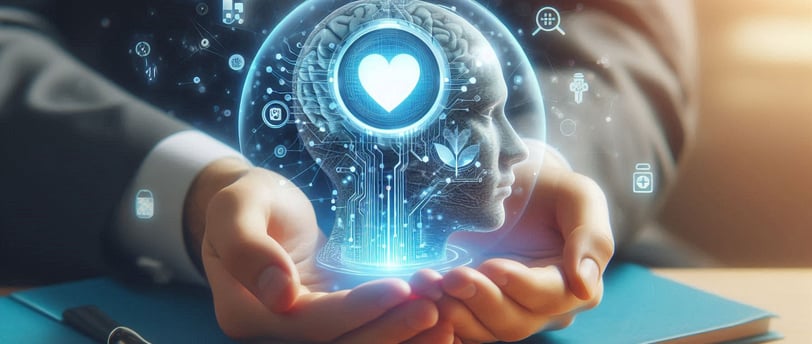AI for Mental Health: How Technology is Transforming Therapy and Support
Discover how AI for mental health is revolutionizing therapy, diagnosis, and support. Explore AI-powered chatbots, predictive analytics, and ethical considerations in this deep dive into digital mental health solutions.
Anna Ryan
2/22/20253 min read


Mental health challenges affect 1 in 4 people globally, yet access to care remains limited by stigma, cost, and a shortage of professionals. Enter artificial intelligence (AI)—a game-changer poised to democratize mental health support. From chatbots offering instant counseling to algorithms predicting suicidal ideation, AI is bridging gaps in care and redefining what’s possible. In this article, we’ll explore how AI-powered therapy, machine learning for diagnosis, and virtual mental health assistants are creating a future where help is always within reach.
The Rise of AI in Mental Health
Why AI?
Mental health care faces three critical challenges:
Accessibility: 60% of people with mental illness go untreated due to geographic or financial barriers.
Stigma: Fear of judgment prevents many from seeking help.
Personalization: Traditional therapy often uses a one-size-fits-all approach.
AI addresses these issues by offering scalable, anonymous, and tailored solutions.
Key Applications of AI in Mental Health
1. AI-Powered Therapy: Chatbots as Digital Counselors
Mental health chatbots like Woebot, Wysa, and Replika use natural language processing (NLP) to simulate therapeutic conversations.
How they work: Users text their feelings, and the chatbot responds with evidence-based techniques like CBT or mindfulness.
Case Study: Woebot reduced symptoms of depression and anxiety by 22% in a Stanford University trial.
Benefits:
24/7 availability.
Lower cost compared to traditional therapy.
Anonymity reduces stigma.
2. AI in Cognitive Behavioral Therapy (CBT)
AI enhances CBT by delivering personalized interventions:
AI-Driven Emotional Analysis: Tools like Ellipsis Health analyze speech patterns to detect anxiety or depression.
Interactive Apps: Apps like Sanvello guide users through CBT exercises tailored to their needs.
3. Machine Learning for Mental Health Diagnosis
Machine learning algorithms analyze data from wearables, social media, and EHRs to identify mental health risks:
Predictive Analytics: Tools like Mindstrong predict depressive episodes by tracking smartphone usage patterns (e.g., typing speed, social interactions).
AI in Psychiatry: IBM’s Watson can cross-reference symptoms with millions of studies to suggest diagnoses.
4. AI-Powered Stress Management
Apps leverage AI to teach stress-reduction techniques:
Biofeedback Tools: Muse headbands use AI to guide meditation based on real-time brainwave data.
Personalized Recommendations: Calm and Headspace suggest content based on user behavior.
5. AI-Enhanced Suicide Prevention
AI models scan social media, forums, and search histories for warning signs:
Facebook’s Suicide Prevention Algorithm: Flags posts with phrases like “I can’t go on” and alerts crisis teams.
Crisis Text Line: Uses AI to prioritize high-risk messages, reducing response times by 50%.
6. Digital Mental Health Solutions and Teletherapy
AI integrates with teletherapy platforms to improve care delivery:
Virtual Mental Health Assistants: Limbic Access triages patients via chatbot before connecting them to human therapists.
AI-Powered Mood Tracking: Apps like Daylio analyze journal entries to identify emotional trends.
Challenges and Ethical Considerations
1. Privacy and Data Security
AI tools collect sensitive data (e.g., voice recordings, text messages). Risks include:
Unauthorized access to personal information.
Misuse of data by third parties.
Solution: Encryption and strict compliance with HIPAA/GDPR regulations.
2. Algorithmic Bias
AI trained on non-diverse datasets may misdiagnose marginalized groups:
Example: A 2019 study found speech analysis AI performed poorly for African American dialects.
Solution: Inclusive data collection and ongoing bias audits.
3. Over-Reliance on Technology
AI cannot replicate human empathy. Risks include:
Missing nuanced emotional cues.
Overlooking cultural context.
The Verdict: AI should complement—not replace—human therapists.
The Future of AI in Mental Health
1. AI-Driven Emotional Analysis Goes Mainstream
Future tools may analyze facial expressions, voice tone, and even eye movements to assess mental states in real time.
2. Predictive Analytics for Early Intervention
Hospitals could use AI to flag at-risk patients before crises occur, similar to how credit scores predict financial risk.
3. Integration with Wearables and IoT
Smartwatches may soon detect panic attacks via heart rate spikes and automatically suggest grounding exercises.
4. Global Mental Health Equity
AI-powered apps could provide free, multilingual support to refugees, low-income communities, and rural areas.
FAQs About AI in Mental Health
Q: Can AI replace human therapists?
A: No. AI excels at scaling support and providing immediate interventions, but human therapists are essential for complex cases and emotional connection.
Q: Are AI mental health tools accurate?
A: Studies show promising results (e.g., chatbots matching human therapists in short-term anxiety reduction), but accuracy varies by tool and use case.
Q: Is my data safe with AI mental health apps?
A: Reputable apps comply with privacy laws, but always review their data policies before use.
Q: How much do AI mental health solutions cost?
A: Many apps offer free basic features, while premium plans range from 10–10–50/month—far cheaper than traditional therapy.
Conclusion: A New Era of Mental Wellness
AI for mental health isn’t just about cutting-edge tech—it’s about hope. For the single parent who can’t afford therapy, the veteran hesitant to seek help, or the student battling silent anxiety, AI offers a lifeline. While challenges like bias and privacy remain, the potential for good is undeniable.
As we navigate this brave new world, one truth stands firm: technology can’t replace human compassion, but it can amplify it. Together, humans and AI can build a future where mental health care is accessible, personalized, and stigma-free.
AI ZENTRO
Stay updated with the latest AI innovations today.
AI ZENTRO © 2025. All rights reserved.
